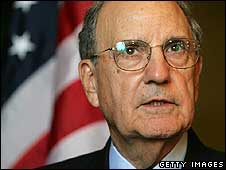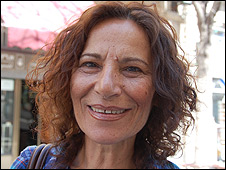
George Mitchell is back in the region but it is not clear when talks will start
|
US Middle East envoy George Mitchell has returned to the region, attempting to restart Israeli-Palestinian indirect peace talks. The US says it expects the so-called proximity talks to start "in the next few days" despite Israeli media reports that they would begin on Wednesday. Palestinian leaders want the backing of the Palestine Liberation Organisation (PLO), not due to meet until Saturday. The talks were delayed in March by a row over building in East Jerusalem. The Palestinians pulled out after an announcement that Israel had approved plans for new homes in the East Jerusalem settlement of Ramat Shlomo during a visit to Israel by US Vice-President Joe Biden. The move caused deep strain in Israeli-US relations. Mr Mitchell is due to meet Israeli Prime Minister Benjamin Netanyahu on Wednesday afternoon, and Palestinian Authority President Mahmoud Abbas on Friday. Despite widespread speculation in the Israeli media that the proximity talks would be launched on Wednesday, a US state department spokesman said only "we hope and expect to formally move forward with proximity talks later this week". The negotiations are expected to involve Mr Mitchell shuttling between the two sides. Israeli-Palestinian peace talks have been stalled since 2008. Talks 'won't work' Correspondents say there is little optimism in the region over the planned indirect negotiations.
 |
ISRAELI AND PALESTINIAN VIEWS
|
Israeli Deputy Prime Minister Dan Meridor told the Jerusalem Post the proximity talks "will not yield results" and "won't work". And senior Israeli military intelligence officer, Brigadier General Yossi Baidatz, said on Wednesday that Mr Abbas was "preparing the ground so that Israel can be blamed for the failure of the talks, if indeed they fail." After the Arab League backed Palestinian participation in the talks on Saturday, Mr Abbas said he did not "want to lose hope". "I... prefer to remain hopeful even though I detect many hurdles and despite the sense that in Israel there are people uninterested in peace," Mr Abbas said.
The Palestinian Authority's formal position is that it will not enter direct talks unless Israel completely halts building in the West Bank and East Jerusalem. In November, Israel announced a 10-month suspension of new building in the West Bank, under heavy US pressure. But it considers areas within the Jerusalem municipality as its territory and thus not subject to the restrictions. But reports suggest that an unofficial slowdown of approvals for major projects in East Jerusalem may have been instigated by Mr Netanyahu in an attempt to help mend relations with the US strained by March's announcement. Israel has occupied the West Bank, including East Jerusalem, since 1967. It insists Jerusalem will remain its undivided capital, although Palestinians want to establish their capital in the east of the city. Nearly half a million Jews live in more than 100 settlements in the West Bank, among a Palestinian population of about 2.5 million. The settlements are illegal under international law, although Israel disputes this.
|

~RS~q~RS~~RS~z~RS~04~RS~)






Bookmark with:
What are these?